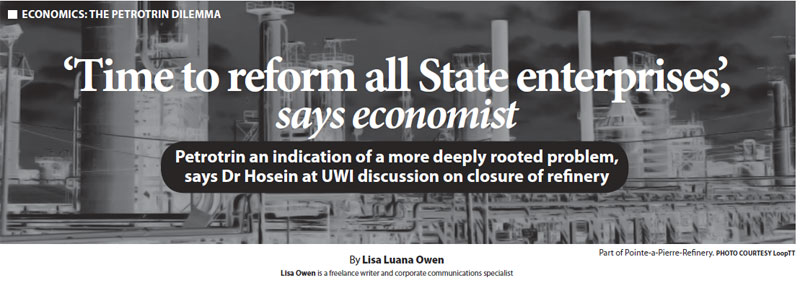 |
 |
 |
|
October 2018 |
Petrotrin began its phased exit of the refining business on October 1, and plans to focus its business on exploration and production. A transition process is expected to be completed by November 30, with severance packages for retrenched workers to cost in the region of $2.6 billion, according to Finance Minister Colm Imbert speaking on Budget Day, October 1. Approximately 4,700 employees – 3,500 permanent workers and about 1,200 non-permanent workers – will be affected.The Department of Economics at The UWI held a public panel discussion on “The Economic Impact of the Closure of the Petrotrin Refinery” on September 19. Featured speakers included Chairman of Petrotrin, Wilfred Espinet; CEO of the Energy Chamber of T&T, Dax Driver; and labour economist David Abdulah. Here are some of the highlights of that discussion. Trinidad and Tobago has long been a nation built on oil. From the discovery of the first oil well in 1857 to our launch into commercial oil production in 1908, our advent into the oil export market in 1910 and subsequent establishment of our first oil refinery at Point-a-Pierre in 1917, T&T has owed its prosperity to this “dark” discovery that has single-handedly helped shape the patterns of our socio-economic development. But now, much is changing. The current indebtedness of state-owned oil company Petrotrin (its debt burden is close to $12 billion, said Finance Minister Colm Imbert in the 2018 Budget) carries the diagnosis of some necessary amputation and immediate reconstruction in order to ensure survival, according to some experts. After listening to some of the discussion at UWI recently, one could be left thinking that Petrotrin’s state may be a symptom of a broader underlying illness infecting the T&T economy.
Dr Hosein said that for State-owned enterprises, debt by 2016 was TT$20.5 billion as compared to TT$7.2 billion in 2007. He strongly disapproved of this indebtedness, commenting: “We do not want to be subsidizing and paying money to State-owned enterprises. We want money (from them)…and at some point in time, in my view, this nonsense has to stop.” He said the total debt in the economy is approximately TT$57.4 billion. The State-owned enterprise debt, as a percentage of total Government debt, is 35.7%. “That is absolutely unnecessary”, he said. Stating the reformation of Petrotrin would not herald the end of this “trying situation”, he said there is an economic process called creative destruction (where innovation deconstructs long-standing arrangements and frees resources to be deployed elsewhere) – “and I personally think that this is a golden opportunity for T&T to use this recession to reform the entire State-owned enterprise system. We have 63, so we need to reform all 63.” The decision to close the refinery was made on recommendation from Petrotrin’s September 2017 appointed Board following a TT$28 million study executed by global financial consultant McKinsey and Company Inc. The study concluded that, if left to continue operations as is, the company would require a cash injection of TT$25 billion over a five-year period to overhaul its infrastructure, service its debt, and restore machinery and equipment that had not been maintained for several years. However, this cost would have to borne by taxpayers, and would still result in an annual haemorrhage. Petrotrin has a TT$12 billion debt and owes Government more than TT$3 billion in taxes and royalties. Additionally, the company has a US$850 million bond payment that becomes due in 2019. McKinsey indicated that although the company had potential to make money in its Exploration and Production (E&P) operations, its Refining and Marketing (R&M) arm was not likely to be profitable.
“We're trying to do an enormous restructuring exercise in a very large company. The final outcome of that is that it would get an E&P stand-alone operation. You would get a T$5 billion dollar free cash flow which nets – when you consolidate all your other issues – a TT$3 billion dollar cash flow,” Espinet said. He added it would mean refinancing existing debt to stretch it out over a longer period of time, but “you will have the ability, with the E&P only operating, to finance all of that operation.” Both the Petrotrin Board and the Government have been vehemently admonished for the apparent lack of transparency in deciding to close the refinery. In the confines of the UWI JFK auditorium, the criticisms in this regard came in hard and fast. Among those proclaiming their dissent were former Petrotrin Board member George De Verteuil and WINAD Director Folade Mutota who called on the Board to share the McKinsey report with the public. However, Espinet said: “I think that I have, as many times as you have asked for it, said McKinsey never produced a report.” He relayed that McKinsey worked together with Petrotrin's team to determine how the R&M division could become cash neutral but concluded that it was not possible because of the quantum of capital required. The beleaguered Chairman said the only way to maintain refinery operations was for the State to take this on as an additional debt, with no understanding of how it was going to be paid, “and we said to the Government: we don't agree to that.” “Our offer was to tell the Government: You don't get involved in this. We don't want you to refinance, we don't want you to do anything. If this has to be refinanced, let it be that it pays for itself rather than have my granddaughter pay for it,” said Espinet.
Abdulah said the union had submitted an option for the leasing of the refinery to foreigners who would be able to put the necessary infrastructure in place to do so. “Knowing what is happening with renewables…the market for hydrocarbons is going to be limited. Surely we need to try to monetise those assets now, in order to build up our reserves in our Heritage and Stabilisation Fund by investing directly in diversification,” said Abdulah. He added that although diversification cannot take place in a one to five-year timeframe, T&T should seek to use its hydrocarbon windfalls and assets to start the diversification process.
In a later public question session, Dr Roger Hosein suggested that the State could consider opening two e-TecK Parks near the refinery to help create jobs to reduce human suffering. “We have a history of saying that we will provide financing for community care and we will aid employment, and then nothing amounts from it. There’s a real human side to this whole dilemma, and so the State can consider that,” said Dr Hosein. |


 Dr Roger Hosein, Senior Lecturer in Economics and Coordinator of UWI’s Trade and Economic Development Unit, said that in his opinion, the local economy is stagnant and “in a bad state.” He said the 2018 economy is almost at the same point as it was in 2007 in terms of the level of GDP, despite producing approximately 3.6 billion barrels of oil and gas equivalent. He said while the growth performance of the national economy from 1999 to 2006 averaged 8.6%, it contracted in the period 2009 to 2017 to -0.51%, which, he said, really troubled him, because “it points to a deeper problem than Petrotrin. Something more deep-rooted is wrong with the system within which State-owned enterprises operate.”
Dr Roger Hosein, Senior Lecturer in Economics and Coordinator of UWI’s Trade and Economic Development Unit, said that in his opinion, the local economy is stagnant and “in a bad state.” He said the 2018 economy is almost at the same point as it was in 2007 in terms of the level of GDP, despite producing approximately 3.6 billion barrels of oil and gas equivalent. He said while the growth performance of the national economy from 1999 to 2006 averaged 8.6%, it contracted in the period 2009 to 2017 to -0.51%, which, he said, really troubled him, because “it points to a deeper problem than Petrotrin. Something more deep-rooted is wrong with the system within which State-owned enterprises operate.” Chairman of Petrotrin, Wilfred Espinet at the UWI discussion said that the Board was given a very clear mandate by Government to make the company profitable and sustainable. He said the current plan to transform the financial performance of the organisation would require an immediate cash investment of TT$10 billion to:
Chairman of Petrotrin, Wilfred Espinet at the UWI discussion said that the Board was given a very clear mandate by Government to make the company profitable and sustainable. He said the current plan to transform the financial performance of the organisation would require an immediate cash investment of TT$10 billion to: Economist David Abdulah, labour rights activist and a former leading member of the Oilfield Workers Trade Union, disagreed with closing the refinery. He argued that the focus should be on improving the refined product in order to stop the losses on the international market where the majority of Petrotrin’s crude is being sold at a lower price than competing West Texan crude because of its high sulphur content and viscosity level, which makes the production process more costly.
Economist David Abdulah, labour rights activist and a former leading member of the Oilfield Workers Trade Union, disagreed with closing the refinery. He argued that the focus should be on improving the refined product in order to stop the losses on the international market where the majority of Petrotrin’s crude is being sold at a lower price than competing West Texan crude because of its high sulphur content and viscosity level, which makes the production process more costly. Dr Thackwray “Dax” Driver, who is CEO of the Energy Chamber of T&T (formerly the South Trinidad Chamber), spoke about how to ameliorate the impacts of the refinery closure. He suggested several things, including:
Dr Thackwray “Dax” Driver, who is CEO of the Energy Chamber of T&T (formerly the South Trinidad Chamber), spoke about how to ameliorate the impacts of the refinery closure. He suggested several things, including: